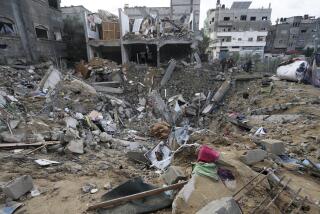Serbs Shell Sarajevo; U.N. Official Seeks Corridor for Aid
- Share via
BELGRADE, Yugoslavia — Serbian forces shelled Sarajevo on Thursday as a U.N. official sought vainly to open a corridor for humanitarian aid to starving residents of the Bosnian capital.
The continuing battles racking Bosnia-Herzegovina suggest that U.N. sanctions imposed nearly a week ago against Serb-controlled Yugoslavia have done little to deter aggression that has taken 5,700 lives in less than two months.
On the contrary, the Belgrade regime has steadfastly denied responsibilityfor the attempts by Serbian forces to violently thwart Bosnian secession from Yugoslavia.
A long standoff appears in the offing between defiant Serbia and Western officials who blame Yugoslavia’s dominant republic for the deadly crisis.
Serbia’s most prominent opposition leader, Vuk Draskovic of the Serbian Renewal Movement, called for collective action against Serbian President Slobodan Milosevic for having shamed and isolated what remains of Yugoslavia.
But Draskovic seemed to concede a lack of public consensus on the need to depose Milosevic, proposing that demonstrations be delayed until the end of the month when international sanctions might begin to bite.
The slim prospects for ending the bloodshed in Bosnia-Herzegovina through economic pressure have prompted some foreign powers to consider military intervention.
In Oslo, foreign ministers of the North Atlantic Treaty Organization removed a potential barrier to a Yugoslav mission by approving the use of troops and equipment for peacekeeping actions in Europe.
The decision will allow NATO to play a more active role in containing ethnic conflicts that trouble the countries of Eastern Europe and the former Soviet Union.
Many Serbs have become fearful of threatened Western military action to deter the Bosnia fighting, prompting Belgrade authorities to distance themselves from the fierce conflict they are widely blamed for instigating.
But some of the Serbian factions attacking Sarajevo and occupying two-thirds of Bosnia are no longer under the control of the Yugoslav leadership that armed and inspired them.
Federal army troops in Bosnia have been demobilized by Belgrade, but most have simply taken their guns and artillery and joined forces with Bosnian Serbs who have continued to pound Sarajevo and other cities they hope to control.
Milosevic appealed last Saturday to Serbian fighters in Bosnia to lay down arms and peacefully resolve their conflict with Slavic Muslims and Croats over the future configuration of the multiethnic republic.
The call was seen as a last-minute attempt to avoid U.N. sanctions.
Despite the appeal, Sarajevo remains under intense shellfire from Serb-held positions, and humanitarian relief convoys have been attacked trying to enter the besieged city.
A senior official of the U.N. peacekeeping mission to Yugoslavia, civilian affairs coordinator Cedric Thornberry, spent a third day in embattled Sarajevo trying to get Serbian rebels to put an end to their siege of the capital’s airport so that food and medicine can be brought in to alleviate widespread hunger.
No agreement has been reached despite intensive U.N. efforts, and Sarajevo residents contacted by phone say they fear the Serbs are trying to starve them into surrender.
Most aid agencies, including the International Red Cross and the Office of the U.N. High Commissioner for Refugees, have suspended relief efforts in Bosnia until the warring factions guarantee the safety of volunteer workers.
A senior Red Cross official was killed near Sarajevo two weeks ago, and the driver of a truck carrying baby food died in an attack on his convoy outside the city Tuesday.
Belgrade’s inability to stop the conflict in Bosnia was acknowledged by U.N. Secretary General Boutros Boutros-Ghali on Wednesday.
His report also said that Croatia was responsible for some of the fighting in Bosnia and repeated a demand that national guardsmen from Croatia withdraw from the republic.
The U.N. report prompted Belgrade officials to call for the lifting of sanctions imposed Saturday on Serbia and Montenegro, the only two republics united in a new Yugoslav federation formed after the secession of Slovenia, Croatia, Bosnia-Herzegovina and Macedonia.
“The report returns and strengthens our trust in the United Nations,” Branko Kostic, acting Yugoslav president, told journalists here.
A senior Foreign Ministry official, Branko Brankovic, argued that Boutros-Ghali’s criticism of the Croats and concession that Belgrade was not fully in control should prompt “the lifting of the sanctions against Yugoslavia and the punishment of the real culprits.”
More to Read
Sign up for Essential California
The most important California stories and recommendations in your inbox every morning.
You may occasionally receive promotional content from the Los Angeles Times.










